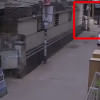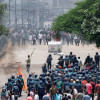All in a Week

Rossing thousands of miles to come to the Bay area should have been fun. Contrary to my expectations, the journey turned out to be a straight disappointment. The unexpectedness of the hot air-cold air collision causing the Airbus 380 to rock me into an awakened state for 16 hours straight from Dubai to San Francisco was a motion to reconcile with. Even after many years of frequent flying, my heart misses a beat when crossing an ocean. Like a child, I always look for the meekest proof of the existence of a solid landscape below. It's almost like believing in me being able to survive a crash against a rock, and not the gentle waves.
Right after being struck with fear of disappearing into the ocean with every little tremor that the big bird experienced, little did I know that the harshest crash was about to happen on April 24, besides the annual critique of Rana Plaza and the focus on the heartlessness of the readymade garment industry. What awaited the apparel sector in Bangladesh was the news of a leading UK retailer going into administration - BHS, the 88-year-old high street brand. Born in 1928, BHS was almost about to go out of business because of not being able to find new financiers to take care of its debt of £ 1.3 billion. While BHS declared distress, 11,000 workers were on the verge of losing their jobs; 64 shops were set to close and manufacturers were turning into flustered creditors overnight. On the other hand, 'Sir' Philip Green, the ex owner of BHS, was partying. The owner of Arcadia Group, Green had taken out £1.2 billion out of the brand's pockets and was buying his third yacht. Sir Philip sold BHS in 2015 to the consortium Retail Acquisitions (RA) for £1, with debts over £1.3 billion and a pension fund deficit of £571 million. Apparently, he is reported to have offered £80 million to support the cost of BHS pensions. What did Green do with the money that he earned from his previous company? He went ahead and paid his wife, Tina, over £400 million in dividends via the tax haven of Monaco. What else did he do? He celebrated his birthday, spending £6.5 million that is potentially the sum of a regular BHS worker working for 200 years. All this surfaced when the BHS group struggled to find buyers to bail the business out and when ultimately, Duff and Phelps were appointed as administrators. In case BHS fails to find buyers, British Home Stores will finally go out of business, just like Woolworth did a while back.
While the collapse of Rana Plaza is perceived as a symbol of corporate greed of a developing economy, the collapse of BHS will be taken as a sign of ultimate shame of the western world that apparently stands for fairness. Sir Philip Green is now hopefully sinking in his newest luxury yacht, as rounds of public shaming followed. In the Parliament, with the minister for business and other lawmakers having pointed their fingers at Green, members were trying hard to push him to give in, while many continue to threaten him with rumours of stripping him off his knighthood. So, for Green, living through the administrator's phase, which may be putting thousands of workers out of work, will possibly remain the harshest memory and pain of his life and beyond.
This problem will definitely impact the Bangladeshi suppliers who have already drawn out their invoices and submitted them to the bank. Suppliers who have shipped and are awaiting payment will have to wait for the administrators to release their money, perhaps now with a serious discount. Above all, the thread of trust has been broken. Even knights are greedy creatures of darkness after all.
In the list of my weekly disappointments, next in line was the announcement of Kanak Mani Dixit's arrest in Nepal. Kanak has been a true "Southasian" (one word, as he himself had always sworn by) for years. A journalist and a passionate activist dedicated to the cause of South Asian integration, Kanak has always lived fearlessly in Nepal. I first met Kanak when he had come to Dhaka with his Beetle Rally all the way from Kathmandu, raising money for his centre for the rehabilitation of victims suffering from spinal injury. He had himself fallen from a cliff while trekking alone in the Annapurna Mountains of the Himalayas in August 2001. Kanak survived the fall and was rescued three days later. The news of arrest of the same man, the first editor of Himal Southasian, on grounds of misappropriating funds of a cooperative that he headed is preposterous, simply because Kanak, coming from a wealthy background, would never ever have to steal money. This time around, upon his arrest, Kanak is definitely set to prove to the South Asian democracies that vendetta is not a wise route and irrespective of quoting legal abracadabra; the likes of Kanak Dixit cannot be kept behind bars forever. I believe Kanak Mani Dixit will rise from the ashes once again, in the same manner he survived his fall fifteen years ago.
The third and the final disappointment came with the news of Xulhaz Mannan, the man who persistently edited the first LGBT magazine, Roopban, in Bangladesh. For many, he was the person who communicated about any event in the US Embassy in Dhaka. During Ambassador Dan Mozena's term in Dhaka, Xulhaz was a regular communicator whose name often popped up in the mailbox, announcing invites and happenings. Xulhaz, along with his friend, was hacked to death in Kalabagan, 48 hours after the murder of the English professor of Rajshahi University, Rezaul Karim Siddique, as the latter walked from his home to a bus station in the northwestern part of the city. Another blogger, a law student, Nazimuddin Samad was murdered in the same manner near Jagannath University earlier this month. The point is, if all these men were murdered for not believing in God or for having believed in free thinking, then let us all remind the militants of the 227th verse of the 26th Surah Al Shu'ara, where the following clearly reads: "And soon the unjust assailants will know what vicissitudes their affairs will take". May they all rest in peace. Amen.
At the crack of dawn, surrounded by the serenity of San Francisco where the wealthy walk in humility, I am wondering and groping for answers that I don't have. Why would reckless greed drive a company to the brink of the biggest corporate disaster in England? Under what pretext was Kanak arrested? Why would these three men lose their lives to those who mask brutality in the garb of theology? Perhaps, we are all pawns, helplessly trapped and marked by players who trample us with their "passionate intensity" at a time when the best, indeed, lack all conviction.
The writer is Managing Director, Mohammadi Group.

 For all latest news, follow The Daily Star's Google News channel.
For all latest news, follow The Daily Star's Google News channel. 








Comments